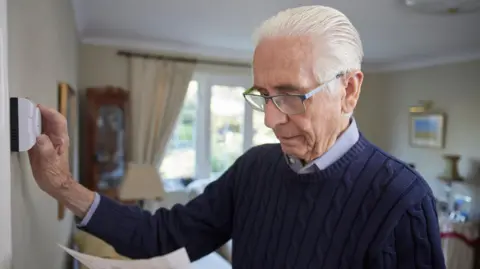 .
.More than 10 million pensioners are not getting the 2024 winter fuel payment, after the government changed the rules.
Payments are only going to those who already receive pension credit or other means-tested financial support. The deadline to submit an online application for pension credit was 23:59 on 21 December.
Pension credit tops up the state pension for those on low incomes, and is a gateway to other benefits like the winter fuel payment.
Government plans to limit the payment have, however, been criticised by some MPs, unions and charities.
What is the winter fuel payment and how have the rules changed?
The winter fuel payment was previously paid to all pensioners to help with energy costs during the coldest period of the year.
But in July, the government said future payments in England and Wales would go only to those on low incomes who received specified benefits such as pension credit.
The changes mean that more than 10 million pensioners will not receive a payment for winter 2024.
Several charities, unions and MPs criticised the decision to means-test the payment.
They expressed concern about the number of older people living on a relatively small income who will miss out, and those who do not currently claim pension credit despite qualifying for it.
The Unite union has asked the High Court for an urgent judicial review of the policy change. It says the government should have gathered more evidence on the impact of the cuts before announcing them.
How much is the winter fuel payment worth?
The winter fuel payment is worth £200 for those on certain benefits and born between 23 September 1944 and 22 September 1958.
For those born before 23 September 1944, and on certain benefits, it is worth £300.
If you live with someone, and jointly claim benefits, only one of the couple receives the payment.
How is the winter fuel payment linked to pension credit?
Although the winter fuel payment is paid automatically, without a direct claim, the vast majority of those eligible will only receive the money if they have first registered to receive pension credit.
This is a state pension top-up, which itself is worth thousands of pounds a year, and can be a gateway to other financial support, including a reduction in council tax, a free TV licence for those aged over 75, or help with NHS costs.
However, an estimated 760,000 eligible pensioners fail to claim it.
You could be eligible for pension credit if you are above state pension age and have an income of less that £218.15 a week, or less than £332.95 as a joint weekly income with your partner. Savings are also taken into account.
Anyone entitled to pension credit for at least one day between 16 and 22 September 2024 will receive the winter fuel payment.
Disabled people, those caring for someone, or those with housing costs could still be eligible even if they have additional income or savings.
You can check your eligibility for pension credit via the government’s online calculator.
Information is also available on how to make a claim online.
The final date to claim pension credit in time to get the 2024 winter fuel payment was 21 December.
When will the 2024 winter fuel payments be made?
The winter fuel payment is usually paid automatically in November or December. Those eligible will receive a letter confirming their entitlement.
However, there could be delays because of the number of extra people claiming pension credit for the first time.
In mid-November, there was a backlog of 90,000 unprocessed claims, with around 9,000 being cleared each week, according to the latest official figures.
With a similar amount of new applications likely to have been made since then, there is a risk that there will still be a backlog of tens of thousands by the end of 2024, according to analysis by BBC Verify.
The Department for Work and Pensions (DWP) said it had deployed 500 additional staff to speed up processing.
What will the rule change mean for the poorest pensioners?
The government estimates 1.9 million pensioners – about 15% – already live in relative poverty.
This means their income is less than 60% of the median.
The median income is the amount of money that divides a population into two, with half earning more, and half less.
In November, Work and Pensions Secretary Liz Kendall confirmed the government expected significantly more pensioners to be in relative poverty due to the new rules:
- an extra 50,000 in the years ending March 2025, March 2026 and March 2028
- an extra 100,000 in the years ending March 2027, March 2029 and March 2030
The annual figures are rounded to the nearest 50,000 and do not take into account any increase in the take-up of pension credit.
Writing to MPs on the Work and Pensions Select Committee, Ms Kendall said means-testing winter fuel payments “was not a decision this government wanted or expected to take” but it was “right that we target support to those who need it most”.
Asked about the figures, Prime Minister Sir Keir Starmer said many pensioners would be better off from April 2025, when both the state pension and pension credit will increase by 4.1%, under “the triple lock” arrangement.
Meanwhile the Committee has launched its own inquiry into pensioner poverty – partly prompted by the winter fuel cut.
How to check if you can claim a benefit
- There is a guide to benefits, who qualifies, and what to do if something goes wrong, provided by the independent MoneyHelper website, backed by government
What is happening in Scotland and Northern Ireland?

